
Democrats meet in crucial debate
The two main Democratic presidential candidates, Hillary Clinton and
Barack Obama, have accused each other of negative campaigning in a TV
debate.
The two also attacked each other's policies on health care, trade and
foreign policy, including the Iraq war.
It is their final face-to-face encounter before next week's crucial
primaries in Ohio and Texas.
|
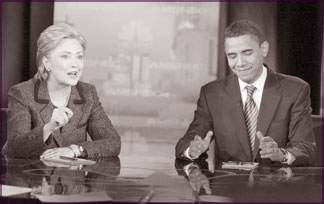
Hillary Clinton and Barack Obama |
Mr Obama is regarded as the front-runner, after winning the previous
11 primaries and caucuses.
Analysts say Mrs Clinton needs big wins in both states to stay in the
race to choose the Democratic candidate at the national nominating
convention in August.
Accusations of dirty tricks and negative campaigning have dogged the
past week of the nomination race. In the opening minutes of the
televised debate in Cleveland, Ohio, the two politely but firmly accused
each other of spreading misinformation about their policies.
"The charges that Senator Obama's campaign has made regarding fliers
and mailers and other information that he has been putting out about my
health care plan and my position on Nafta (the North America Free Trade
Agreement) have been very disturbing to me," Mrs Clinton said.
Mr Obama retorted that his rival's campaign had "constantly sent out
negative attacks on us... We haven't whined about it because I
understand that's the nature of these campaigns."
Both insisted they stood for universal healthcare, and that the
other's programme would leave some people without cover.
Mr Obama sought to draw a line, however, under the appearance of a
controversial photograph of him wearing traditional Somali robes during
a visit to Kenya in 2006. He said he believed Mrs Clinton when she said
she did not know where the photo had come from.
Mrs Clinton and Mr Obama went on to say that they would both seek to
renegotiate Nafta with Canada and Mexico, under threat of opting out of
the seven-year-old pact.
Obama momentum
The contest between the two Democratic front-runners has become
increasingly heated in recent days.
In a debate last week, Mrs Clinton accused Mr Obama of political
plagiarism - a reference to his apparent copying of a supporter's
rhetoric. Mrs Clinton now needs to win a majority of the delegates in
the remaining state primaries and caucuses to stay in the race to choose
the Democratic candidate for November's presidential election.
Ohio and Texas, both big states, are being seen as must wins for her.
Several polls suggest Mr Obama is gaining ground in both Texas and
Ohio. The Illinois senator is leading in Texas for the first time, with
50% compared to 46% for Mrs Clinton, according to a CNN poll. On
Tuesday, Mr Obama won endorsement from a former rival for the Democratic
nomination, Senator Christopher Dodd.
BBC
'Diagnosed transsexuals' in Iran
Homosexual relationships are banned in Iran, but the country allows
sex change operations and hundreds of men have elected for surgery to
change their lives.
by Vanessa Barford
"He wants to kill me. He keeps telling me to come home so he can kill
me. He had put rat poison in my tea."
For Ali Askar, at age 24, the decision to become a woman came at a
heavy cost. His father threatened to kill him if he went ahead with
surgery.
|
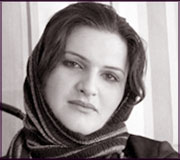
Ali Askar had a sex change operation and is now called Negar |
Now renamed Negar, she says she would not have had the operation if
she did not live in Iran.
"If I didn't have to operate, I wouldn't do it. I wouldn't touch
God's work." But as Ali, he felt he had no identity.
He could not work with men because they sexually harassed him and
made fun of him. But he could not work with women because he was not
officially a woman. "I am Iranian. I want to live here and this society
tells you: you have to be either a man or a woman".
Sex changes have been legal in Iran since Ayatollah Khomeini, the
spiritual leader of the 1979 Islamic revolution, passed a fatwa - a
religious edict - authorising them for "diagnosed transsexuals" 25 years
ago.
|
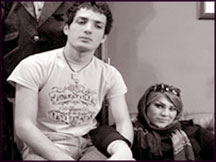
Anahita and her boyfriend got engaged after the operation. |
Today, Iran carries out more sex change operations than any other
nation in the world except for Thailand. The government even provides up
to half the cost for those needing financial assistance and a sex change
is recognised on your birth certificate.
"Islam has a cure for people suffering from this problem. If they
want to change their gender, the path is open," says Hojatol Islam
Muhammad Mehdi Kariminia, the religious cleric responsible for gender
reassignment.
He says an operation is no more a sin than "changing wheat to flour
to bread". Yet homosexuality is still punishable by death.
"The discussion is fundamentally separate from a discussion regarding
homosexuals. Absolutely not related.
Sex change surgery
Homosexuals are doing something unnatural and against religion," says
Kariminia. "It is clearly stated in our Islamic law that such behaviour
is not allowed because it disrupts the social order."
Dr Mir-Jalali, a Paris-trained surgeon, is Iran's leading specialist
in sex change surgery.
He claims to have performed over 450 operations in the last 12 years.
Many of his patients are struggling to figure out what to do because
they do not fit into the norm. They see Dr Mir-Jalali as a saviour.
"Transsexuals feel that their body doesn't match how they feel," he
says. "Whatever you do, psychiatrists, pills, prison, punishment,
nothing helps".
Another of his patients, Anoosh, 21, was deeply unhappy before
surgery and felt pressured to leave school because of his feminine
behaviour and appearance.
"I wanted to live like everyone else, like all the other boys and
girls walking around. My goal was simply to find my own identity." Like
many young people in Iran, Anoosh struggled to reconcile his sexual
identity with the wishes of family, community and culture. He says he
was continuously harassed and threatened with arrest by Iran's morality
police before he had his sex change.
His boyfriend was also keen for him to go ahead with the sex change
because 90% of the people they passed in the street said something
nasty.
"When he goes out in female clothes and has a female appearance it is
easier for me to persuade myself that he is a girl. It makes the
relationship better," he says.
For Anoosh's younger brother, Ali Reza, it was harder to come to
terms with Anoosh's desire to become a woman.
"I have had a brother for many years. I can't just suddenly accept
him as my sister. If I refer to him as my brother he gets upset. But
it's hard for me to believe this".
Anoosh's mother, Shahin, raised her children alone and had high hopes
for her son.
"My child was meant to be the star of the family. I counted on him to
be something other than this".
Avoiding shame
Documentary film maker Tanaz Eshaghian spent weeks filming Anoosh,
Ali and other transsexuals in Iran.
She thinks that part of what is driving many of the boys to operate
is the desire to avoid shame.
"If you are a male with female tendencies, they don't see that as
something natural or genetic. They see it as someone who is consciously
acting dirty."
Being diagnosed as a transsexual makes it a medical condition, not a
moral one. Once a doctor has made a diagnosis - and an operation is in
the pipeline - the transsexual can get official permission from his
local government official to cross-dress in public.
"They look for a solution that will at least allow them to be
attracted to the gender they are naturally attracted to - without
feelings of shame, sin and wrong-doing - and move around in society
without harassment. The price is often being disowned by your family,"
says Tanaz Eshaghian.
After surgery
Ali Askar - now renamed Negar and aged 27 - said that after the sex
change operation she was initially depressed.
"But now, it's like I have been born again and I am in a new world."
But her family's reaction has taken its toll. Although they warned
her she would be disowned, she thought that they would change their mind
after the operation.
"They pray for me to die soon. If I'd known that my family would
truly shun me like this, I would never have done it."
She now lives with other transsexuals who have had a sex change.
She has had to work as a prostitute to make ends meet.
Rejection by her parents has affected her deeply: "When parents can
kill the love for their own child inside themselves, I have killed love
in my being. I will never fall in love".
But for Anoosh - who has changed her name to Anahita - there is a
more positive outcome.
"Now when someone is attracted to me, it is as a girl," she says.
She is now engaged to her boyfriend and even her mother is happy.
"A boy will always just get married and leave his mum, but a girl
stays, a girl is always yours and will never leave, and now I will never
experience the sadness that occurs when a boy leaves.
"I always wanted a daughter and I think it's a gift from God that I
finally got one."
BBC
Nepal ethnic group talks collapse
by Charles Haviland
Rajendra Mahato said his newly formed Madhesi front will carry on its
general strike in the south of Nepal, which has strangled fuel supplies
nationwide.
Madhesis, roughly a third of Nepal's population, are now demanding
rights after years of neglect.
|
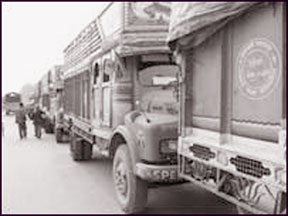
Lorries queue for fuel in southern Nepal |
Reports say the police have shot another man dead in violence related
to the two-week-old strike.
Mr Mahato, who recently resigned as a cabinet minister, told the BBC
his Madhesi front's latest talks with the government had failed, because
Kathmandu had shown "no interest" in making concessions on their
demands.
These include asking for their own state within Nepal, with the right
to self-determination.
Madhesis are a populous group of south Nepalese peoples who have
always been largely excluded from political power and representation.
'Irresponsible government'
Another Madhesi official said the talks had "collapsed" and described
the government as "irresponsible".
His faction wants a further delay to elections due in April.
Government ministers could not be reached for comment.
Many Nepalis think postponing the vote would be dangerous. The
government does not want to set a precedent in encouraging
ethnically-based autonomy in this highly diverse society.
With the Madhesi front's general strike in the south set to go on,
violence has continued.
Reports say the police shot dead a demonstrating man, a day after
another protestor and a policeman were killed further east.
Houses of non-Madhesi politicians in the south have been firebombed.
There are reports of ambulances being attacked. Many local curfews have
been imposed.
These are partly to allow tankers to bring in petrol and cooking gas
from India.
There are now severe shortages of all basic fuels across the country.
Hospitals, schools and domestic life are badly affected - indeed, so
are most activities and sectors.
The crisis shows how a new, ethnic dimension to Nepalese politics is
now here to stay.
BBC
Kamenei hails Iran 'nuclear win'
Iran's Supreme Leader Ayatollah Ali Khamenei has hailed Iran's "great
victory" over its nuclear programme.
Mr Khamenei praised President Mahmoud Ahmadinejad's handling of the
issue. Last week, the UN nuclear watchdog said Iran was being more
transparent, but had not given "credible assurances" that it was not
building a bomb.
|
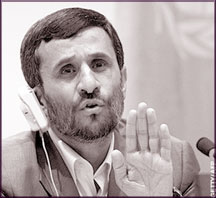
President Mahmoud Ahmadinejad |
On Monday, the agency heard that Iran may have continued secret work
on nuclear weapons after 2003, the date US intelligence suggested the
work ceased. Tehran has dismissed the allegations as "forgeries".
The permanent members of the UN Security Council - the US, UK, China,
France and Russia - are meeting in Washington to discuss the possibility
of imposing further sanctions on Iran over its disputed atomic programme.
Western countries suspect Iran aims to produce a nuclear bomb. Tehran
insists its programme is aimed purely at generating electricity.
Praise
"One example of an advance by the Islamic system has been the nuclear
issue, in which the Iranian nation has honestly and seriously achieved a
great victory," Mr Khamenei said on Tuesday.
|
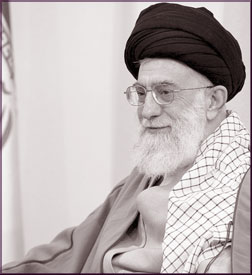
Ayatollah Ali Khamenei |
"Those people who used to say Iran's nuclear activity must be
dismantled are now saying we are ready to accept your advances, on
condition that it will not continue indefinitely.
"This is a great advance that would not have been realised except
with perseverance," he said.
He went on to praise President Ahmadinejad's "outstanding" handling
of the stand-off with the West.
Under Iran's system of government, the supreme leader had the final
say in major policy matters.
In a rare public gesture last month, Mr Khamenei overruled the
president over the implementation of a gas sector bill.
The fact that he decided to go public on the issue was interpreted as
a signal that he wanted to convey he was not happy with the president.
Mr Ahmadinejad has said no amount of UN sanctions will deter Tehran
from its nuclear path.
"If they want to continue with that path of sanctions, we will not be
harmed. They can issue resolutions for 100 years," he said in a
televised interview on Saturday.
A US National Intelligence Estimate released last December said
Tehran had frozen its atomic programme in 2003.
But documents presented to the International Atomic Energy Agency (IAEA)
suggest the work continued.
The material was presented to the agency's 35-nation board by the
IAEA's head of safeguards, Olli Heinonen, in a closed-door meeting on
Monday.
Simon Smith, Britain's ambassador to the IAEA, said material
presented to the IAEA in Vienna came from multiple sources and included
designs for a nuclear warhead, plus information on how it would perform
and how it would fit onto a missile.
"Certainly some of the dates that we were talking about ... went
beyond 2003," he said.
BBC
How Kenyan talks ground to a halt
by Adam Mynott
Coming more than a month since he began mediation efforts between the
Kenyan government/Party of National Unity (PNU) and the opposition
Orange Democratic Movement (ODM), it is a sign of considerable
frustration.

The former UN chief said this was not a "desperate measure" but a
necessary move after no progress in negotiations in the past 48 hours.
Talks between the two panels, he said, had turned acrimonious and he
would now take the outstanding issues to the two principals, President
Mwai Kibaki and Raila Odinga.
Until now, the two four-person panels had been negotiating and
referring decisions to their leaders, but it has become a process mired
in indecision and prevarication. "Now," Kofi Annan said, "it is time for
the leaders to become engaged in the process."
He has decided to talk directly with the president and his opposite
number in the hope that it "might lead to a more speedy resolution".
This is not the end of the process but it is a very serious
development, which does not augur well.
New post
The negotiations involve four stages: the first two, an end to
violence which has caused the deaths of at least 1,000 people and
tackling the humanitarian crisis where up to 600,000 people have been
forced from their homes by unrest, were agreed quickly, within days of
Kofi Annan starting mediation talks.
Stage Three was always going to be difficult as it involved trying to
find a political agreement out of the disputed election, which would
enable Kenya to emerge from the worst crisis it has faced since
independence more than 40 years ago.
Various options were on the table, including re-tallying the votes
cast for president, a re-election, an interim government and a
power-sharing agreement. Kofi Annan ruled out a re-election on the
grounds that the situation in the country was far too tense to be able
to handle another ballot, certainly in the short term.
With the support of the United States, the European Union and others
in the international community, discussions centred on setting up an
interim government with power shared between the PNU and the ODM.
At the heart of this was the creation of the post of prime minister,
an office which does not exist in the Kenyan constitution.
'Deteriorating atmosphere'
The fourth stage involves long-term, deep-rooted changes to Kenya's
institutions and constitution and this process has not begun. Kofi Annan
said it might take a year or more. The ODM said it was prepared to make
concessions and abandon its demand that President Kibaki should resign,
but it insisted that if it were to get the post of prime minister, it
should be a position that has executive power.
The PNU engaged in talks about creating the position of prime
minister, but it has been reluctant to invest executive power and
authority in the post. This is where the talks have unravelled.
A senior figure involved in the panel led by Kofi Annan has said that
over the past three days of talks, Friday, Monday and Tuesday, the
atmosphere became worse and worse.
Positions, the figure added, have suddenly changed, new texts have
been introduced and he pointed the finger at the government for
displaying a complete reluctance to actively engage with the possibility
of yielding power under an interim administration.
Mutula Kilonzo, leading panel member for the government, said the
very fact that it was prepared to allow the creation of the new position
of prime minister showed its willingness to engage in meaningful
negotiations.
But Musalia Mudavadi from the ODM panel said no real concessions were
being offered by the government and there were no indications that the
government wanted to give the prime minister any meaningful powers.
One day things were apparently agreed by the PNU, he said, and the
next there were reversals.
There is no timetable for the meetings Kofi Annan plans to have with
Mwai Kibaki and Raila Odinga but he has made it clear that delay is not
an option.
BBC
Former Pakistan PM to run for MP
Pakistan's former prime minister, Nawaz Sharif, will stand for
parliament in a by-election, a party spokesman says.
Mr Sharif's Pakistan Muslim League-N party is currently in
negotiations over joining a coalition government. His party won the
second highest number of seats in polls that last week delivered a huge
blow to President Pervez Musharraf's allies.
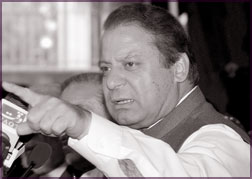
Mr Sharif currently does not have a parliamentary seat and is
ineligible to stand for PM.
He is also barred from being prime minister again because he has
already held the office twice. His party has already said it will ask
its coalition partner to provide a PM.
The PML-N last week agreed to join a coalition headed by the Pakistan
People's Party (PPP), which won the most seats in the parliamentary
polls.
The PPP is widely expected to nominate its vice chairman and
stalwart, Makhdoom Amin Fahim, as prime minister.
Like Mr Sharif, the PPP leader Asif Ali Zardari is not a member of
parliament and therefore cannot be a candidate for PM.
Tentative coalition
He took over at the helm of the party after the assassination in
December of his wife - another former Pakistani PM, Benazir Bhutto. A
spokesman for the Pakistan Muslim League-Nawaz (PML-N) said Mr Sharif
and his brother were both planning to take part in by-elections.
"Nawaz Sharif and Shahbaz Sharif will contest by-elections," Siddiqul
Farooq told the AFP news agency.
"There is no dearth of vacant seats and the Sharifs can contest
by-elections without any problem." Several by-elections are expected to
be held in the next few weeks. Many details of the coalition between the
PML-N and PPP have yet to be worked out and the two parties have a long
history of mutual mistrust.
Blow to Musharraf
Mr Sharif and his brother had been banned from taking direct part in
general elections because of a series of criminal convictions dating
back to 1999, when a military coup brought President Musharraf to power.
The former prime minister returned from exile in Saudi Arabia late
last year to lead his party's poll battle. He has been deeply critical
of President Musharraf and says he wants "to rid Pakistan of
dictatorship forever".
The new coalition is seen as a threat to Mr Musharraf and may use its
parliamentary clout to unseat him.
The president was re-elected late last year in a parliamentary vote
boycotted by the opposition as unconstitutional.
He has been a major US ally in the "war on terror" but his popularity
has waned at home amid accusations of authoritarianism and incompetence.
BBC |
